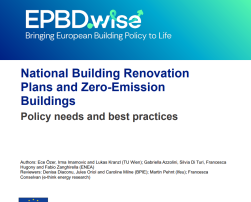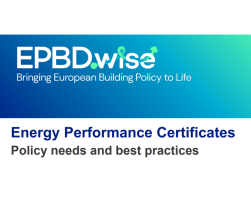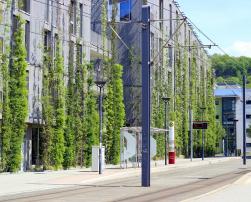
Regio1st releases a guidebook to navigate its Planning Framework helping regions in their energy plans
Soon after the release of its Planning Framework, the Regio1st LIFE-CET project is now releasing a guidance helping regional energy planners in Europe to develop and implement sustainable, cost-effective energy strategies while prioritising energy savings in buildings and energy efficiency solutions in line with the EE1st principle.

National Building Renovation Plans and Zero-Emission Buildings: policy needs and best practices
National Building Renovation Plans (NBRPs) and zero-emission buildings (ZEBs) are recent additions to the revised Energy Performance of Buildings Directive (EPBD 2024/1275). This report examines the policy requirements for implementing NBRPs and ZEBs in the focus countries of the EPBD.wise project: Bulgaria, Greece, Hungary, Poland, Romania, and Ukraine.

European Energy Efficiency Guide 2024
EAE’s Energy Efficiency Guide is a meta-study that summarises relevant facts and figures about the energy efficiency of Europe’s building stock, relevant legislation, technical developments and how ETICS contribute to achieving Europe’s environmental, economic and social objectives. It condenses the evidence of numerous global, European and national scientific studies and provides recommendations on what can be done to triple the number of buildings undergoing deep or staged deep renovations or new buildings to become net carbon neutral by 2050.

EPBD Article 9 – Minimum Energy Performance Standards (MEPS) and trajectories for progressive renovation: Policy needs and analysis of good practice examples
Minimum Energy Performance Standards (MEPS) are new policy components introduced in Article 9 of the revised Energy Performance of Buildings Directive (EPBD 2024/1275). This report examines the policy requirements for implementing MEPS in the focus countries of the EPBD.wise project: Bulgaria, Greece, Hungary, Poland, Romania, and Ukraine.

Implementing Renovation Passports: Policy needs, status quo and best practices
Renovation Passports are a newly introduced feature in the updated Energy Performance of Buildings Directive (EPBD 2024/1275). This report examines the policy requirements related to the implementation of Renovation Passports in the focus countries of the EPBD.wise project: Bulgaria, Greece, Hungary, Poland, Romania, and Ukraine.

Energy Performance Certificates: policy needs and best practices
Enhancing and rescaling the Energy Performance Certificate (EPC) scheme is a significant update brought about by the revised Energy Performance of Buildings Directive (EPBD 2024/1275). This report examines the policy requirements for implementing the new EPC standards in the focus countries of the EPBD.wise project: Bulgaria, Greece, Hungary, Poland, Romania, and Ukraine.

Unlocking the potential of community-driven models to drive residential renovation: insights from six case studies
One-stop-shops have the potential to significantly bridge the divide between energy efficiency subsidies and building renovations. By examining six successful one-stop-shops, this report underscores the importance of adopting a holistic approach to their implementation, focusing on the key principles of inclusivity, adaptability, and sustainability.

What do we need to reach a circular economy in construction? The facades case study
The paper explores how fragmented collaborations in the building industry can be unified to advance circular economy practices in facade design and servitisation, highlighting the need for ecosystem-wide engagement and the role of digital technologies.

Evaluating smart readiness of high-performance buildings in South Tyrol
Smart technologies enhance building environments and energy efficiency, with the Smart Readiness Indicator assessing their integration. This study, analysing 59 high performance buildings in South Tyrol, Italy, shows varied readiness levels but no clear link to energy performance class.

Integrating grey and green infrastructure: a model for sustainable urban growth in the Netherlands by 2050
Integrating green infrastructure with dense urban construction in the Netherlands can enhance ecosystem services and increase green areas, guiding sustainable urban planning amid growing urban populations.